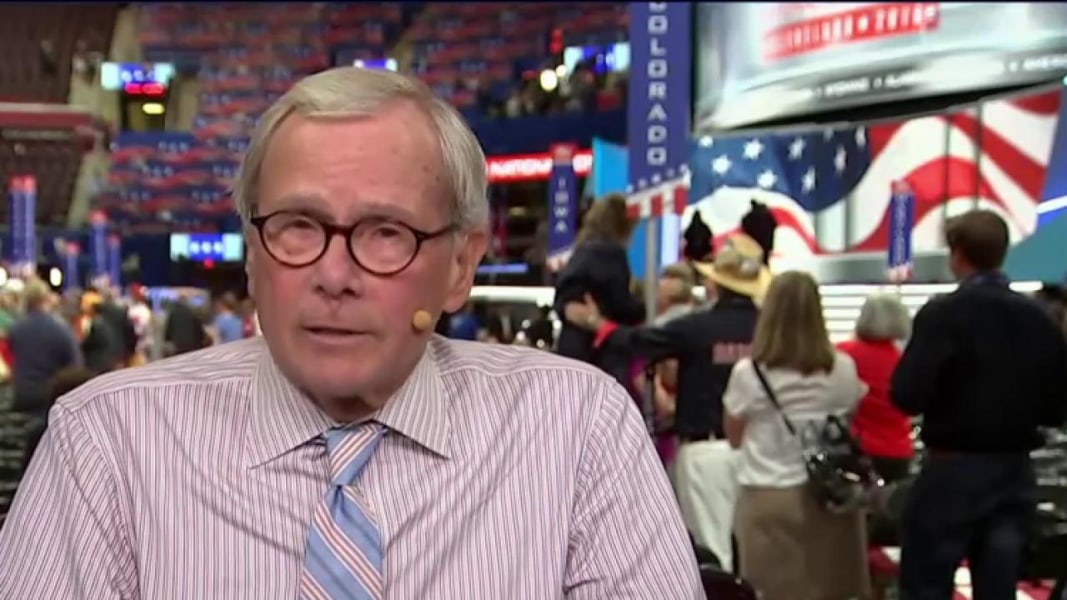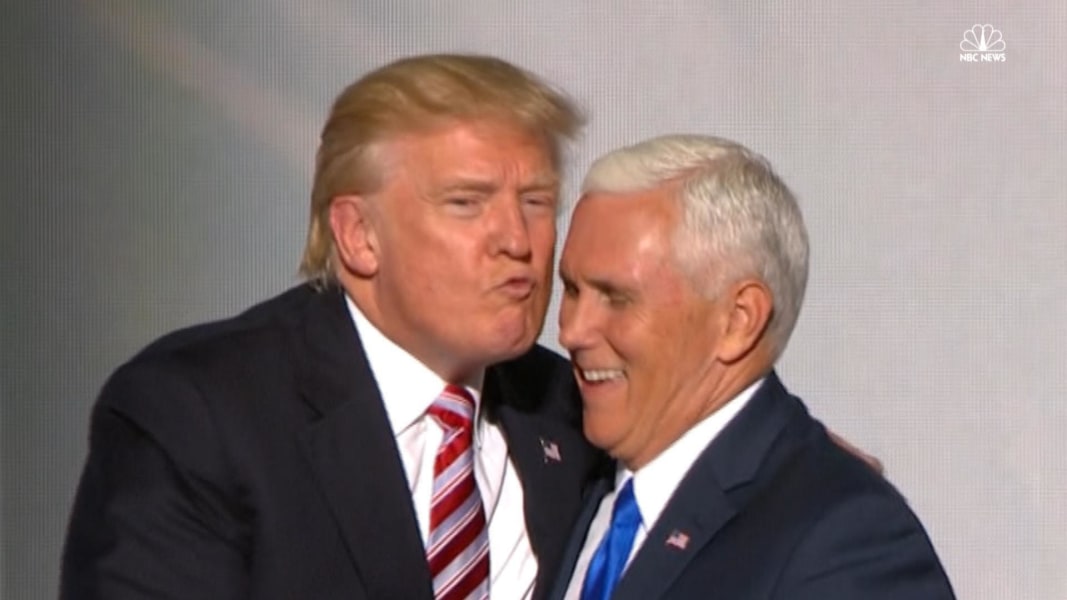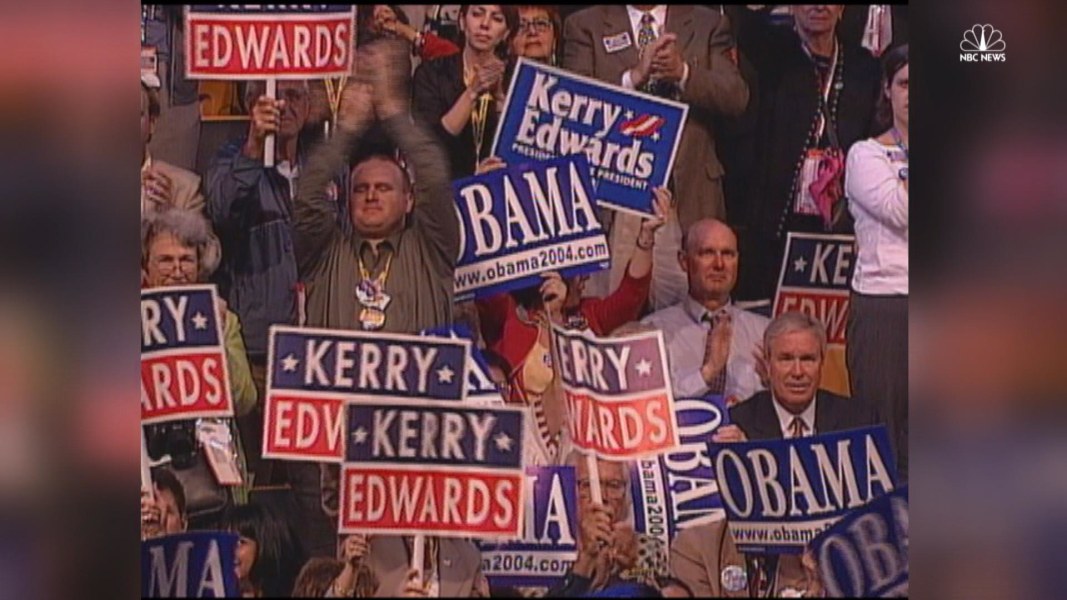I don't like Ted Cruz, rackless in his own campaign with bully language; however, he gave an articulated conservative speech in RNC, making him in the list below.
Trump children? Besides glorified super dad, I didn't see any substances of their own. For example, I did expect Eric Trump, 38-year-old, with five children, talked about how he fathers those five kids, but he didn't.
See the goofy mouth of old Trump (photo below). Look at those photos along the way, the same goofy mouth - that's his nature, a calculated business man, lack of 器宇 Deportment/tempermant, never reaching a global view of great politician.
Can you count how many times some bird change colors in occastions? Technically, the bird's feathers never change color. Down in his heart, Trump was not, never will be a man with a big heart for a greater America, as you and I wish. Last night, he didn't convey any inspiration and vision for a greater America, besides dark, divided, scary, angry, screaming, yelling, ugly, bitter image of America. He's NO Reagan, enthusiastic, optimistic, constructive, and hopeful.
May God bless America. May God bring peace on Earth.
P.S., Scanning all the news, I found some level-headed comments - "Equal justice under law" - that's the bottomline. You don't name-calling, cursing, hat-forcing - that shows how low you're - don' t wish (put your own wishful on either RNC or DNC , sucking up either doesn't do you any good without specifics - I don't see either give a damn what you think - one-sided romance.)
不許要特別為華裔做什麽,無論好壞
隻要是基於本著排除種族、膚色和宗教信仰上的歧視,以事實為依據、法律為準繩一律平等對待就行,我們絕大多數勤勞刻苦,遵紀守法,不管學曆高低的華人都有常識,都會支持那個政黨。
~~~
怎麽就讓華人把子孫交給共和黨了?這年頭華裔的牌都沒人打,更不要說什麽畫餅或者許諾了。
Political Correctness 好歹還讓人不敢說疼校亞裔太多,想方設法弄點全麵發展的理由。換個沒有PC的環境,人直接告訴你一個配額,你怎麽辦?難道還真的以為有共和黨(白人也好黑人也好)會願意許諾以 SAT 考分決定,讓亞裔占領所有好學校?
真有人相信?就像有人相信鞋子襪子不在中國造了,會回到密蘇裏造?
~~~
~~~
From Clinton to Obama: Non-Nominee Convention Speeches That Made an Impact
As the dust settles -- and the balloons deflate -- from this week's RNC in Cleveland, pundits and voters are grappling with the substance of what they saw.
Will this convention be defined by its self-inflicted gaffes, like Melania Trump's apparently plagiarized speech? Will it be the launching pad of a new political family dynasty headlined by Donald Trump, Jr., Eric Trump and Ivanka Trump -- all of whom gave well-received addresses? Did Donald Trump himself, a self-described billionaire who has a record of outsourcing jobs overseas, effectively cast himself as a champion for the American working man? Will Sen. Ted Cruz's controversial "vote your conscience" speech be retroactively viewed as prescient instead of an act of political self-destruction?
What is evident is that unless you count Rudy Giuliani's aggressive performance or Chris Christie's kangaroo-style court indictment of Hillary Clinton, this convention was surprisingly bereft of breakout stars or moments. Certainly, Trump's lengthy and tonally ominous acceptance speech has people talking, but historically there are usually non-nominee politicians who use the convention as launching pad, or at least try to.
Here are some famous examples from the past 40 years of convention speeches delivered by politicians who weren't even their party's nominee that had real impact.
Barbara Jordan, 1976
The Texas lawmaker and breakout star of the Watergate hearings was the first African-American woman to give a keynote address at a national convention, and she made the most of her moment in the spotlight -- delivering a moving and acclaimed ode to the Democratic Party's ability to champion the cause of unity. Her speech was so well-received that her name was floated as a long-shot choice to be nominee Jimmy Carter's running mate, and she eventually did receive a single delegate's vote for president that year.
Ted Kennedy, 1980
After their bitter primary fight, the tension at the DNC in 1980 revolved around how and when then-President Jimmy Carter and Sen. Ted Kennedy would make up. At the convention, Kennedy delivered perhaps his most stirring and famous piece of oratory -- "the dream shall never die" speech -- but never offered a full-throated endorsement of Carter, only congratulating him on his victory. When his address was over, Kennedy tried to avoid physically embracing the president who trailed behind him awkwardly. Carter would later allege in his private journal that his primary opponent had been drinking that night. While the speech is remembered as one of the most inspirational in recent political history, Kennedy's tepid support for the incumbent helped doom him in November.
Mario Cuomo, 1984
The late New York governor significantly raised his national profile with his eloquent rebuttal to President Reagan's romanticized "city on a hill" remarks. Cuomo effectively disseminated what Democrats saw as the hollowness of the Reagan era's economic recovery in his keynote address in 1984. "A shining city is perhaps all the president sees from the portico of the White House and the veranda of his ranch, where everyone seems to be doing well," he said. "But there's another city ... the part where some people can't pay their mortgages, and most young people can't afford one; where students can't afford the education they need, and middle-class parents watch the dreams they hold for their children evaporate." Cuomo's speech was so well-received it kicked off nearly a decade of speculation that he would seek the presidency, and infamous indecision on his part about whether he would. He ultimately would never mount a White House bid.
Bill Clinton, 1988
A baby-faced, 41-year-old Bill Clinton, then governor of Arkansas, flopped in his featured role at the 1988 DNC, where he was tasked with introducing nominee Massachusetts Gov. Michael Dukakis. The characteristically long-winded Clinton went on for a full 33 minutes, and drew uncomfortable cheers when he said "in closing." At the time, the perception was that Clinton had pre-emptively short-circuited his promising political career. But in an early glimpse of his dexterity, he had fun lampooning the poorly received address during a subsequent appearance on "The Tonight Show starring Johnny Carson." Of course, Clinton would get the last laugh -- he would be the nominee and eventual victor himself in just four years.
Pat Buchanan, 1992
The former-speechwriter-turned-fiercely-conservative-commentator brought his insurgent campaign for the White House to the RNC in 1992, and delivered a polarizing speech, which provided red meat for the far right of the GOP, but appeared to be out of the step with the more moderate populace. Buchanan railed against the Democrats' -- and the Clintons' -- advocacy for "homosexual rights" and "women in combat units" in a speech that centered on what would be labeled the "culture wars." Buchanan's rhetoric would become more mainstream orthodoxy in the party in the ensuing years, his speech illustrated the growing gulf between the two major parties on social issues, and his "Make America First" ideology has a direct descendant in Trump.
Barack Obama, 2004
Prior to his iconic keynote address at the DNC in 2004, Obama was a little known, but promising, young state senator from Illinois. But after the "son of a goat herder" delivered his impassioned, unapologetically patriotic plea for a United States of America as opposed to a country split between red and blue political party lines, he became a household name and an overnight sensation. The speech would be credited with propelling Obama to the U.S. Senate and eventually the White House. And although his vision of a post-partisan utopia hasn't materialized, the speech suggested that there was a national appetite for consensus-building.
Zell Miller, 2004
That same year, the conservative Democratic senator from Georgia, Zell Miller, gave a speech that couldn't have been further removed from Obama's in terms of its tone and delivery. Ironically, Miller had been the keynote speaker for the Democrats in 1992, but in 2004 he crossed over to support the Republicans. In a furious, some would argue vicious, speech, he accused Democratic nominee Sen. John Kerry of wanting to arm the U.S. military with nothing more than "spitballs." Following his speech (which some Republicans quickly distanced themselves from), a still-incensed Miller would challenge MSNBC's Chris Matthews to a duel for questioning his rhetoric.
Martin O'Malley, 2012
The Maryland governor and former Baltimore mayor had long been a trendy pick for a future VP or presidential nomination when he spoke at the DNC in 2012, but his relatively uninspired speech and presence muted the hype that had once been attached to his name. Perhaps had he given a more memorable address, O'Malley's 2016 campaign would have generated more excitement in a race where the front-runner was decidedly unpopular and his other chief rival was a 74-year-old socialist.



